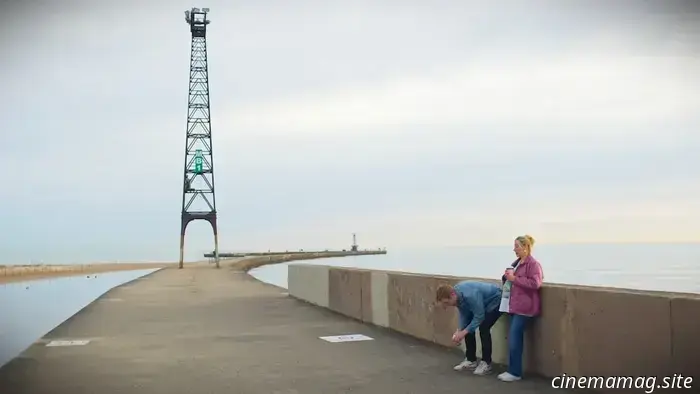
Cannes Review: The Phoenician Scheme Sees Wes Anderson Struggling with the Narrative in a Frantic, Wearying Spy Comedy
The film opens with music that is unusually tense for a Wes Anderson feature, featuring driving cellos leading a full orchestra that feels more aligned with Mission: Impossible than Moonrise Kingdom, alongside a sequence reminiscent of Nolan blockbusters: an assassination attempt. This creates an exciting start to a narrative that quickly loses momentum. Legendary criminal mastermind Zsa Zsa Korda (Benicio del Toro) is seated in front of a beautifully designed train car, similar to the off-white, wooden, burgundy, and plaid train car that will transport him and his associates around Phoenicia throughout the film. An unfortunate associate is squished in the back corner, and without warning, a bomb destroys that corner completely, propelling us into The Phoenician Scheme without pause.
Zsa Zsa is a truly dreadful individual, openly unapologetic about his deeds while completely unaware of what makes them wrong. He genuinely asks, “Why would anyone do something I didn’t instruct them to do?” He engages in bribery, money laundering, racketeering, bank fraud, inciting wars, tax evasion, and resides in an Italian Palazzo, where the cold, varied marbled interiors contribute significantly to the film's stark mood.
It has been six years since Zsa Zsa last saw his daughter Liesl (newcomer Mia Threapleton), but a brush with death leads him to call her back from her life as a nun, intending for her to be the sole heir to his estate in the event any of the numerous assassination attempts on his life succeed. Although he has nine biological sons, which is irrelevant in the grand scheme, they offer some amusing moments, as do the adopted children. (Since Rushmore, Anderson has excelled at eliciting comedic performances from children.)
The villain frequently finds himself in airplane crashes—this is his sixth, and not his last in the film—barely escaping death as various governments, intelligence agencies, and powerful individuals plot against him. Being stateless and completely unaccountable to any laws, this is the only way to prevent his quest for global domination through endless illegal activities. Anderson conveys this in a furious blizzard of precise details, side and backstory explorations, and design flourishes, characteristics that have defined his storytelling since The Royal Tenenbaums. He effectively communicates his points regarding characters and tone, but while this has enhanced his previous films, the relentless pace here diminishes that impact.
There are subplots involving a murdered wife, the “no slavery, no famine, no dormitories” angle, hand grenade antics, or Anderson’s quirky version of a basketball game. Bryan Cranston and Tom Hanks appear, yet all these elements feel inconsequential compared to the main focus: bridging the gap. Zsa Zsa, accompanied by Liesl and insect tutor Bjorn (a delightful Michael Cera), is determined to secure the final funding needed to complete the (almost) newly minted Trans-mountain Locomotive Tunnel project, where both ends of the track humorously fail to meet in the center.
The fundraising should be straightforward. It’s a feasible amount to secure, and Zsa Zsa has both his team and proposed estimates for the final bill. However, Zsa Zsa, in his depraved state, keeps trying to cheat his business associates, who catch him time after time, causing the funding for the last track segment to slip from his hands repeatedly. The Phoenician Scheme is divided into five fundraising chapters (represented by shoeboxes containing Zsa Zsa’s plans), featuring encounters with crafty characters like Marseille Bob (Mathieu Amalric), Prince Farouk (Riz Ahmed), and Uncle Nubar (Benedict Cumberbatch), with the crew of side characters expanding with each chapter.
For the first time, Wes Anderson has indulged excessively in his penchant for quirkiness. The Phoenician Scheme is overly formulaic, getting lost in absurdly calculated dialogue, structure, storylines, and designs that become exhausting to follow, let alone keep up with. While it is often charming, beautiful, impressive, and well-scored (and we’ll soon mention the design spectacle), these qualities aren’t sufficient for a director of his caliber. Where is the emotional depth? The feeling? The unique Owen Wilson perspective that infused life into his storytelling?
In the Criterion commentary for The Royal Tenenbaums, Anderson shared that his films up to that point (Bottle Rocket, Rushmore, Tenenbaums) represented a convergence of his and Owen Wilson’s perspectives. Tenenbaums marked the last film he co-wrote with Wilson, whose roles diminished amidst an expansive cast. It’s now clearer what elements belonged to Anderson and what originated from Wilson, especially in terms of the humanity that Wilson’s contributions provided to Anderson’s artistic vision: a focus on craft and design overshadowing his attention to relatable, emotional intricacies in storytelling and character, to the extent that he
Other articles
 12 Timeless Films from the 1940s That Remain Enjoyable to View
These timeless films from the 1940s have aged remarkably well over the years: Despite their imperfections, they acknowledge and explore facets of human nature.
12 Timeless Films from the 1940s That Remain Enjoyable to View
These timeless films from the 1940s have aged remarkably well over the years: Despite their imperfections, they acknowledge and explore facets of human nature.
 Why Are Films So Poor Nowadays? - MovieMaker Magazine
Something feels wrong. Many recent films aren’t simply forgettable; they are strikingly dull. It’s akin to gnawing on soggy cardboard with
Why Are Films So Poor Nowadays? - MovieMaker Magazine
Something feels wrong. Many recent films aren’t simply forgettable; they are strikingly dull. It’s akin to gnawing on soggy cardboard with
 We Developed Stephanie Stevens Using the 666 Method: $6K, 6 Days, 6 Individuals - MovieMaker Magazine
Kelsey Ann Wacker and Nathan Simpson are the creators and leads of Stephanie Stevens — a movie centered around an awkward conversation during a walk between a comedian contemplating suicide and
We Developed Stephanie Stevens Using the 666 Method: $6K, 6 Days, 6 Individuals - MovieMaker Magazine
Kelsey Ann Wacker and Nathan Simpson are the creators and leads of Stephanie Stevens — a movie centered around an awkward conversation during a walk between a comedian contemplating suicide and
 Reexploring Iconic Films: Odd Elements That Don't Quite Align - MovieMaker Magazine
If you enjoy fast-paced movies more than the slower ones, we hit the rewind button to review some details you may have overlooked. And guess what?
Reexploring Iconic Films: Odd Elements That Don't Quite Align - MovieMaker Magazine
If you enjoy fast-paced movies more than the slower ones, we hit the rewind button to review some details you may have overlooked. And guess what?
 4K Restoration Trailer for Hearts of Darkness: A Filmmaker’s Apocalypse Investigates the Turbulent Production of Francis Ford Coppola’s War Masterpiece
Just a week ago, we learned that Mike Figgis' documentary Megadoc, which delves into the development of Francis Ford Coppola's long-anticipated passion project Megalopolis, is set to hit theaters. But before that, one of the most remarkable portrayals of filmmaking will be released in theaters across the U.S. and U.K. It features stunning footage from Coppola's late wife.
4K Restoration Trailer for Hearts of Darkness: A Filmmaker’s Apocalypse Investigates the Turbulent Production of Francis Ford Coppola’s War Masterpiece
Just a week ago, we learned that Mike Figgis' documentary Megadoc, which delves into the development of Francis Ford Coppola's long-anticipated passion project Megalopolis, is set to hit theaters. But before that, one of the most remarkable portrayals of filmmaking will be released in theaters across the U.S. and U.K. It features stunning footage from Coppola's late wife.
 The Top 5 Film Twists of All Time
The Top 5 Film Twists of All Time
Cannes Review: The Phoenician Scheme Sees Wes Anderson Struggling with the Narrative in a Frantic, Wearying Spy Comedy
We start off with music that is unusually tense for a Wes Anderson movie—grinding cellos leading a complete orchestra that feels more like Mission: Impossible than Moonrise Kingdom—and an opening reminiscent of Nolan’s blockbusters: an assassination attempt. It’s an exciting introduction to a narrative that quickly begins to lose momentum. The infamous criminal genius Zsa Zsa Korda (Benicio del Toro) is seated
